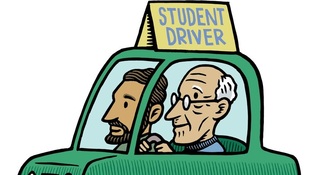 loading
loading
FindingsDriver's ed for the elderly Gregory NemecView full imagePeople over 70 have a higher per-mile crash rate than any age group in this country except teenagers. Moreover, the number of older drivers is projected to increase 50 percent between 1990 and 2020. That creates "a demographic imperative" to address the safety problem, says Associate Professor of Medicine Richard Marottoli ’80, ’84MD, ’91MPH. He and his colleagues set out to see whether elderly drivers at risk of accidents can learn to be safer—and avoid the devastating impact that losing the ability to drive can have on the elderly. Marottoli, medical director of the Dorothy Adler Geriatric Assessment Center at Yale-New Haven Hospital, says he is often asked whether a senior can continue driving, but "we didn't have very good data to decide." Marottoli and his colleagues recruited local drivers aged 70 and up and screened out the best and worst. Volunteers then received eight hours of classroom instruction and two hours behind the wheel, focusing on common problems of older drivers: left turns, lane changes, maintaining speed. A control group learned about vehicle maintenance and home safety. Then the participants were tested again. Those who'd been to older-drivers' ed improved their driving performance by an average of 2.87 points on a 72-point scale. Marottoli estimates that the 2.87 points might represent a 9.5 percent decrease in crash risk. (The study appeared in the October 2007 Journal of Gerontology.) "The tricky question," Marottoli notes, "is how do you translate that into the real world?" He hopes future research will pinpoint the most effective techniques and expand them to larger groups.
The comment period has expired.
|
|